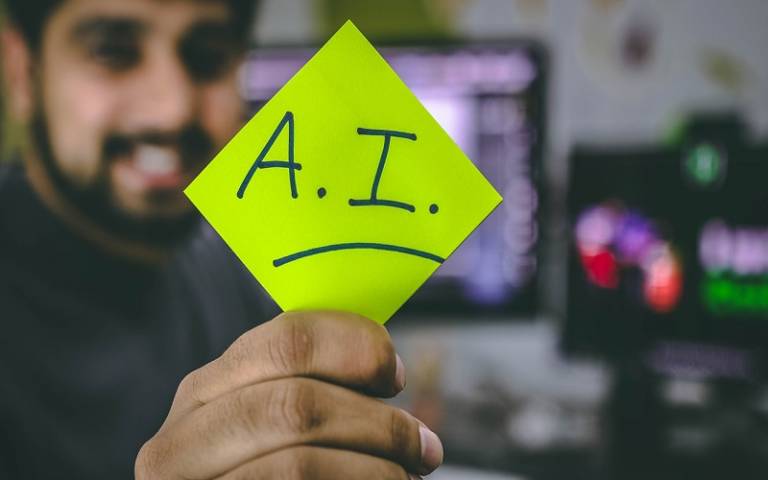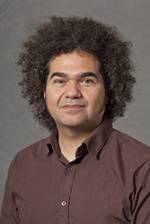Artificial Intelligence for Biomedicine and Healthcare is a pioneering new Master's launching at UCL in 2022. Programme Director, Professor Delmiro Fernandez-Reyes, shares his insights.

Delmiro, why is now a good time to get into artificial intelligence (AI) focused on biomedicine and healthcare?
AI is becoming mainstream, just like many other sciences that came before it. Whenever this happens with science or technology, different niches start to open up.
Biomedicine and healthcare is an example of an area where AI can have significant and transformative effects.
It’s already being used in many ways in the medical domain, and there are countless opportunities for those who choose to specialise in this area of AI.
How is AI currently being used in the medical ecosystem?
AI capabilities are being harnessed to aid diagnosis and treatment selection as well as preventative medicine.
It is widely used in medical imaging, computational pathology, robotics for surgery and drug discovery and repurposing.
AI technologies offer opportunities to augment the capabilities of human experts and reduce cognitive overloads that can help clinicians see more patients and give an improved quality of care.
AI can also support processes in biomedicine and healthcare, such as optimising complex biomedical research, clinical trials and the optimisation of healthcare provision.
Every medical speciality can make use of AI technologies providing a dynamic space for innovation to support curative and preventative medicine.
What learning opportunities are there for students on the Artificial Intelligence for Biomedicine and Healthcare MSc?
All students are taught foundational and applied AI skills needed to master the technology.
This requires some technical expertise, which is why it’s essential for students to have a background in computer science, mathematics, statistics, engineering, or physical sciences.
The training provides the basis to go on to rigorously apply AI approaches to challenges in biomedicine and healthcare.
Students have the opportunity to work on a project with a stakeholder to find a solution for a relevant problem in the biomedicine or healthcare area.
This is an essential component of the programme, as students get hands-on practice and can explore the complexities of a particular problem, while using AI in the biomedical sphere.
For example, in some other sectors, if your algorithm achieves 70-80%, everyone is happy. In biomedicine or healthcare, it needs to be much more robust and reliable.
As important as learning how to apply AI technology at the highest level, students learn working within an interdisciplinary environment, and how to communicate effectively with different stakeholders, from technical specialists, biomedical scientists to clinicians.
UCL has a strong reputation in medicine, healthcare and biomedicine, as well as everything from social sciences, physical sciences to the engineering sciences, so our students can take advantage of the variety of expertise we have here.
That’s another thing that really sets this programme apart.
What kind of contact do students get with practitioners and industry through the programme?
The project component is a great way for students to get to know an organisation and experts well.
Who exactly they work with depends on the interests of the particular student.
UCL Computer Science has strong links with all the key medical providers, including the NHS, public and private healthcare, as well as the tech ecosystem, from Google to the smaller start-ups.
As a department, UCL Computer Science has a key combination of expertise that the students have access to throughout the programme.
My colleague, Professor John Shawe-Taylor, is the UNESCO Chair of Artificial Intelligence at UCL, giving us important links with UNESCO.
I am trained in the three focal areas of this programme – I’m a medical doctor, a biomedical scientist and a computational scientist.
We’re lucky to have the right combination of expertise to train students in this niche – that’s what makes this programme particularly exciting.
We also work closely with UCL Business, who come in to do expert talks for students, helping them with advice and expertise on what directions they could go in with this Master’s degree.
What are the emerging trends in AI at the moment?
The topic of fairness and ethics in AI is critically important in the domain, and the social responsibility that comes with developing and applying technologies such as AI.
There are ongoing debates and discussions about ethics in AI, and how a framework should be created for it.
We very much want students to join us to listen and take part in these discussions – we want them to become part of the conversation, because they will become part of the future of implementing AI ethically and responsibly.
Wherever they go on to work, they will take some important ideas with them about ethics.
What jobs and employers will graduates go towards after studying the Artificial Intelligence for Biomedicine and Healthcare MSc?
The prospects are wide. There is currently a lack of expertise in this area, so we’re training the future specialists of the AI for biomedicine and healthcare domain.
One of the key priority areas for the UK government is AI, so opportunities in the field as a whole are going to continue flourishing.
There are a variety of opportunities in both the public sector and the private sector, in the UK, Europe and elsewhere in the world.
Since all graduates from this programme will have expert skills in AI, they can apply this to any sector, and the big technology companies such as Google and Amazon are some of the obvious destinations.
Looking at health-related specialisms, a number of digital health companies are recruiting heavily at the moment.
In terms of the start-up world, we are catalysts for enterprise like this too. The start-up world is a place where there is a strong need for AI experts with biomedical or healthcare specialisms.
Our focus is to develop graduates who are high level practitioners who can work within multi-disciplinary teams tackling biomedical and healthcare challenges.
This is where the future is.
 Close
Close


